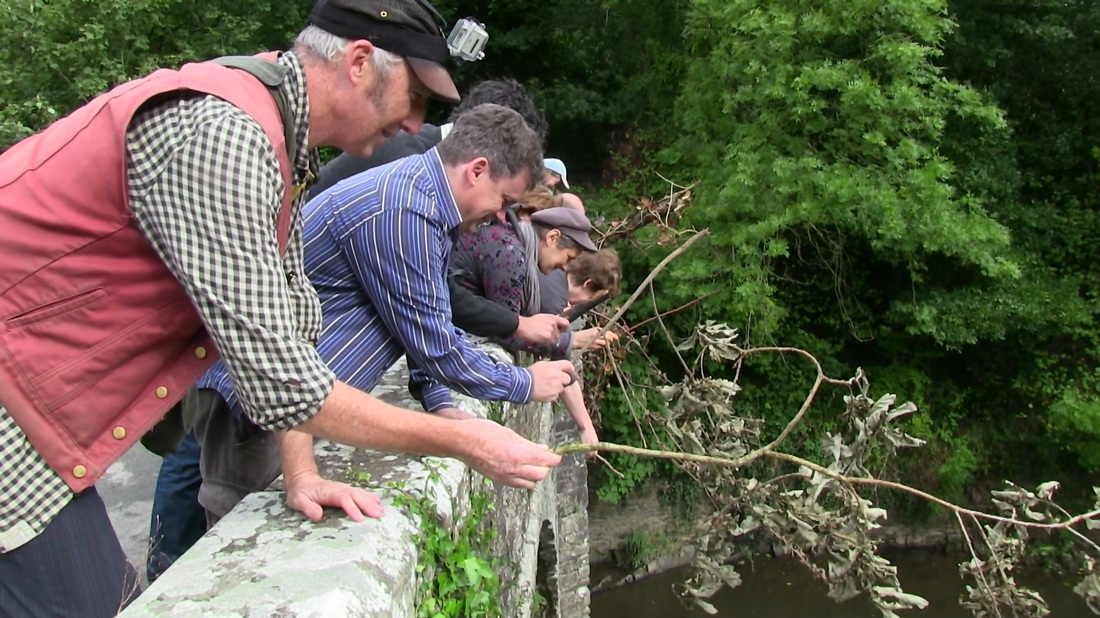The workshop was an experience-based enquiry. I did not know much about the workshop area, its landscape or catchments. I knew only a few of the people from previous conferences..
The workshop really began over dinner, with information shared by experts. Then the next day we would have an expert tour of the Culm a unique ecosystem, at the top of the catchment basin. We then had a boat ride in the estuary guided by a fisherman. We felt the landscape changes from the mouth of the river (with its old industrial structures, and new summer homes) to the wooded upper river that came alive with wildlife. Meanwhile Antony was checking the conductivity in the saline water, everyone was taking pictures and talking together. The last day of the workshop we were asked to go into the Torridge River. In early October it was a cloudy day. I did not bring my swimming suit. Niamh was impressive, she jumped in the Torridge River first, then others followed little by little. François said something touched her foot in the water. Was it fish? This encouraged me to follow them. The middle of the river was deeper but people could stand on the smooth riverbed. The water was cold. I put my face down to float. I felt little fear until suddenly I felt a sharp pain on my shoulder. (I am being treated for a bad shoulder.) But when my body started floating, I became relaxed. I could see under water. It was greenish brown. The colour of the water reminded me of similar experiences in Pittsburgh, Pennsylvania, U.S.A. Tim and I worked on a research project called 3 Rivers 2nd Nature (3R2N) between 2000 and 2005. It was one of the summers we were on the project boat. Tim and I had dived in the Allegheny River. The water was warm but refreshing, it felt endlessly deep and big, it felt wide and very long. I could not see much, just greenish brown colour. We had spent years learning everything we could about the ecological recovery of nature and culture. I still hear the voice of that place, its experts and communities. And in my mind I still see myself going through the landscape, with millions of Mayfly in the air, and schools of fish cfollowing and playing with our boat.
Empathetic experience moves towards something foreign rather than something familiar. In this workshop the greenish brown coloured water was something familiar and the coldness of the Torridge River was the foreign experience for me. I was surprised when I did not become panic in the water when I could not rely on my arm because of the shoulder pain. I sat on the anchor of the bridge to watch other people. It was another foreign experience to be in the water together. I thought about the last two days talking, eating and doing things together with a respectful manner, but we did not know each other much. We kept smiling at each other. After we dressed again, we became a little more playful. We dropped twigs from the bridge to see which one could go through the bridge first. Owain’s fern won.
Any one can touch the water of the river. It is quite possible a person does not have any memorable experience of a river. Then, the experience becomes foundational; but this is not likely. Everything we do is a learning opportunity that may expand experience it may not prove to be meaningful until some time in the future. How about people who have had a water epiphany already? Touching water is a beginning of the discourse to listen to others including people, things and the environment in deeper level. After the workshop some people submitted their reflection writing. Different individuals experience and expertise result in diverse stories. Each of us is connected to different parts of the world. Each of us shuffles the words and re-constructs the story for the new audience. In this repeated process a little schism occurs. Empathy tries to fill the gap between familiar and foreign, known and unknown within new experience, and perhaps with other people’s voice. If we meditate well in this process we may understand others a little further. New language can emerge when we understand the other and find the reason why it as important us, as other people are.
Reiko Goto Collins, 30 November 2013

 RSS Feed
RSS Feed
